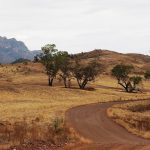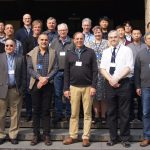
Graduate Director Report: April 2019
March 27, 2019 3:00 pm Comments Off on Graduate Director Report: April 2019Graduate Director Melissa Hart gives a high level overview of the CLEX Research Development Program.

Graduate Director Melissa Hart gives a high level overview of the CLEX Research Development Program.

Ian Macadam explains what a knowledge broker does and reports on a WeatheX workshop and recent meetings between CLEx and external stakeholders.

If you need to create an academic poster in a hurry, we have a nice template here that can cut it down to an hour and still be effective. Also check out Kim Reid's new PhD blog and find out about the recent combined Centre of Excellence media workshop.

The past four months have seen Extreme Rainfall researchers win a slew of awards and produce some important foundational research on storms, hybrid cyclones, and some unexpected influences on extreme rainfall events.

AMOS awards, international visitors, cross program research with the drought team, and multiple papers have made it a busy time for the Heatwaves and Cold Air Outbreaks Research Program.

New students, an OA for Andy Pitman and some key work on evaporation, the impacts of mesophyll conductance on plant growth, a new algorithm for photosynthesis and future projections of drought made for a strong start to 2019.

The Climate Variability and Teleconnections team welcomed new members, celebrated a range of triumphs and explored questions about Antarctic sea ice extent, ocean heat transfer, ENSO and the Tropical Observing System.

The 20th Argo Steering Team meeting (AST-20) was hosted by the Second Institute of Oceanography, State Oceanic Administration, in Hangzhou, China, the week of March 11-15. Argo is the international program to maintain at least 3000 profiling floats throughout the global ocean.

Two workshops, the Sea Ice Modelling Workshop and Centre of Excellence for Climate Extremes “Southern Annular Mode (SAM) Cluster” workshop were held together at the Institute for Marine and Antarctic Studies in Hobart from February 19-21.

Schools Weather and Air Quality (SWAQ) is a citizen science project funded by the Australian Government’s Department of Industry, Innovation and Science as part of its Inspiring Australia - Citizen Engagement Program.